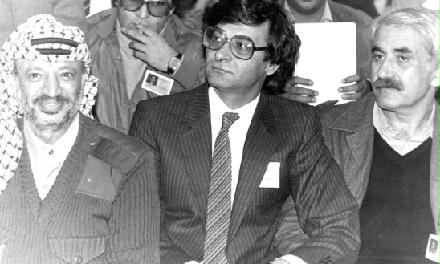by ZEINA G. HALAB

Like a prophet, Mahmoud Darwish is positioned between the tragic past of the Palestinian nakba, the present of occupation and exile, and hopes for a liberated future. Zeina G. Halabi places him in the context of the Arab enlightenment and the post-Arab Spring world to offer Palestinian liberation as a way of redeeming all humanity.
In ‘We, the Intellectuals’, Palestinian artist Oraib Toukan reflects on the complex relationship between intellectuals and the politics of cultural institutions in a post-Arab Spring world. She recounts a 1997 incident when Mahmoud Darwish read ‘In Ritsos’s Home’ to a packed auditorium at Amman’s Royal Cultural Centre. Upon reciting the verses ‘O Palestine/name of the earth/and name of the heavens/you shall prevail’, he was interrupted by a few zealous listeners, who chanted – perhaps not so spontaneously – ‘Long live His Majesty King Hussein the great!’
This explosive example of Jordanian authoritarian nationalism was nothing less than an orchestrated sabotage of Darwish’s verse, setting the power of the king against the poet’s prophecy of Palestinian liberation. Toukan recalls:
Darwish simply cleared his throat with a firm ‘ahem’ and moved on to his next verse. ‘In Pablo Neruda’s home, on the Pacific coast, I remembered Yannis Ritsos’, he read. ‘I said: What is poetry? He said: It’s that mysterious event, it’s that inexplicable longing that makes a thing into a spectre, and makes a spectre into a thing’.Flash-forward to now and a ‘Long Live the King’ interruption today would certainly cause a writer to pack up, leave, reject, refuse, and decline invitations from the institution thereafter. There are simply more cultural institutions to choose from – more thinkers, more artists, more spaces, more patrons, more of everything, really… Moral authority has been democratized. Anyone can speak truth to power; besides, power knows the truth.1
From the perspective of the Darwish-Ritsos exchange, Toukan is speaking from the future. We are in 2013, sixteen years after Darwish was hosted at the Royal Cultural Centre, and five years after his death; Toukan’s world abounds with bloody uprisings, military coups, and intellectuals associated with authoritarian regimes and institutions that construct truth as much as they disseminate it. In this sense intellectuals are ‘agents of regimes of truth’ and mediators of ideology and its social effects.2
Eurozine for more
